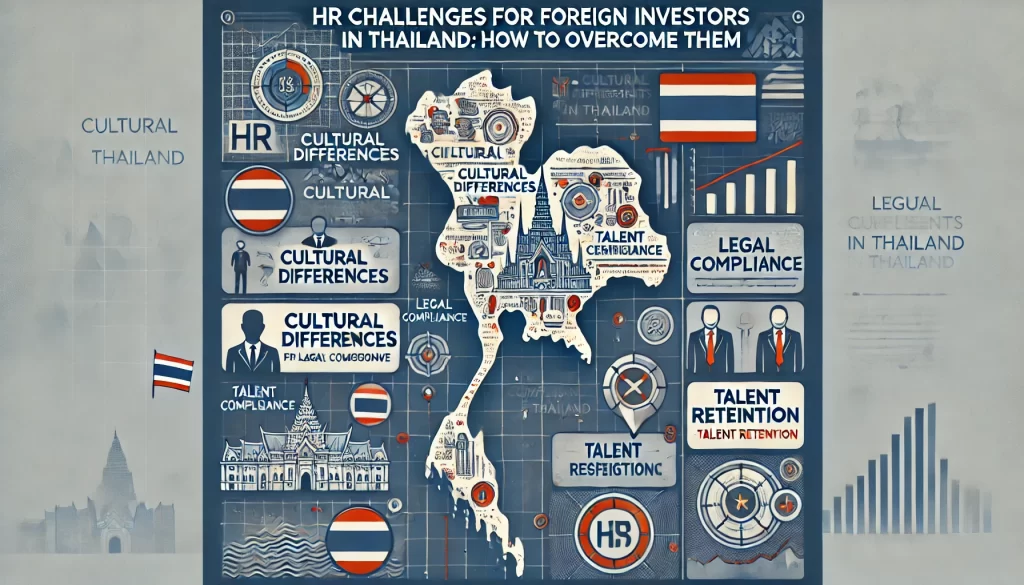Are you struggling to navigate the complex world of HR management as a foreign investor in Thailand? 🇹🇭 You’re not alone. Many international businesses face significant challenges when it comes to human resources in this vibrant Southeast Asian nation.
From deciphering intricate labor laws to bridging cultural gaps, the hurdles can seem insurmountable. But fear not! With the right knowledge and strategies, you can transform these challenges into opportunities for growth and success. In this blog post, we’ll dive deep into the seven key HR challenges facing foreign investors in Thailand and provide you with practical solutions to overcome them.
Whether you’re grappling with recruitment issues, language barriers, or compliance concerns, we’ve got you covered. Join us as we explore how to build a thriving workforce in Thailand, ensuring your business not only survives but thrives in this dynamic market. Let’s embark on this journey to HR excellence together!
Understanding Thailand’s Labor Laws
A. Key employment regulations
Thailand’s labor laws are comprehensive and can be complex for foreign investors. The primary legislation governing employment relationships is the Labor Protection Act B.E. 2541 (1998). This act covers crucial aspects such as working hours, holidays, leave entitlements, and termination procedures.
Key regulations include:
- Maximum working hours: 8 hours per day, 48 hours per week
- Minimum wage: Varies by province, ranging from 313-336 baht per day
- Overtime pay: At least 1.5 times the normal hourly rate
- Annual leave: Minimum 6 days after one year of continuous employment
| Aspect | Regulation |
|---|---|
| Probation period | Maximum 119 days |
| Severance pay | Based on length of service, up to 400 days’ wages |
| Maternity leave | 98 days (45 days paid by employer) |
B. Work permit requirements
Foreign workers in Thailand must obtain a valid work permit before commencing employment. The process involves:
- Securing a non-immigrant visa
- Applying for a work permit through the Ministry of Labor
- Maintaining the work permit’s validity throughout employment
Employers must ensure compliance with the Foreign Workers Employment Act, which regulates the hiring of non-Thai nationals.
C. Labor protection standards
Navigating Cultural Differences in the Workplace

Thai business etiquette
Understanding Thai business etiquette is crucial for foreign investors to successfully navigate cultural differences in the workplace. Here are some key aspects to consider:
- Wai greeting: A respectful bow with hands pressed together
- Dress code: Conservative and formal attire
- Business cards: Present and receive with both hands
- Punctuality: Arrive on time, but expect some flexibility
| Do’s | Don’ts |
|---|---|
| Remove shoes when entering homes or temples | Point with your feet |
| Respect the Thai royal family | Touch someone’s head |
| Use honorific titles and last names | Show public displays of affection |
Communication styles
Thai communication often emphasizes indirect and non-confrontational approaches. Key points include:
- High-context culture: Meaning often conveyed through context and non-verbal cues
- Saving face: Avoid public criticism or embarrassment
- Kreng jai: Consideration for others’ feelings and reluctance to impose
Hierarchy and respect
Thai workplace culture places great importance on hierarchy and respect:
- Age and position: Older individuals and those in higher positions command more respect
- Decision-making: Often top-down, with less emphasis on collaborative processes
- Addressing superiors: Use appropriate titles and show deference
Building relationships with local employees
Developing strong relationships is vital for success in Thailand:
- Participate in team-building activities
- Show interest in Thai culture and customs
- Learn basic Thai phrases
- Be patient and understanding of cultural differences
By embracing these cultural nuances, foreign investors can create a harmonious work environment and foster positive relationships with Thai employees.
Recruiting and Retaining Top Talent

Effective hiring strategies
To attract top talent in Thailand, foreign investors must adopt tailored recruitment strategies:
- Leverage local job boards and social media platforms
- Partner with Thai universities for graduate recruitment
- Utilize professional networking events and industry conferences
- Engage reputable recruitment agencies with local expertise
| Strategy | Advantages | Challenges |
|---|---|---|
| Local job boards | Wide reach, cost-effective | High volume of applications |
| University partnerships | Access to fresh talent | May require training |
| Networking events | Direct interaction, quality candidates | Time-consuming |
| Recruitment agencies | Local knowledge, pre-screened candidates | Higher costs |
Competitive compensation packages
Offering attractive remuneration is crucial for attracting and retaining skilled professionals:
- Conduct regular salary surveys to stay competitive
- Implement performance-based bonuses and incentives
- Provide comprehensive health insurance and wellness programs
- Offer flexible work arrangements and paid time off
Employee development programs
Investing in employee growth fosters loyalty and enhances skill sets:
- Mentorship programs
- Cross-functional training opportunities
- Leadership development initiatives
- Sponsored professional certifications
- Regular skill-building workshops
Creating an attractive company culture
A positive work environment is essential for employee satisfaction and retention:
- Promote work-life balance
- Encourage open communication and feedback
- Recognize and reward employee achievements
- Organize team-building activities and social events
- Emphasize corporate social responsibility initiatives
By implementing these strategies, foreign investors can overcome HR challenges and build a strong, motivated workforce in Thailand. With a focus on effective recruitment, competitive compensation, continuous development, and a positive culture, companies can position themselves as employers of choice in the Thai market.
Managing Language Barriers

Importance of bilingual HR staff
In Thailand’s diverse business landscape, having bilingual HR staff is crucial for foreign investors. These professionals bridge the communication gap between management and local employees, ensuring smooth operations and fostering a positive work environment.
| Benefits of Bilingual HR Staff |
|---|
| Improved communication |
| Enhanced cultural understanding |
| Efficient conflict resolution |
| Better talent acquisition |
Providing language training
Investing in language training programs for both expatriate and local employees can significantly reduce language barriers. This approach not only improves communication but also demonstrates a commitment to employee development.
- Offer Thai language classes for foreign staff
- Provide English language courses for local employees
- Implement immersion programs for faster language acquisition
- Encourage language exchange between team members
Utilizing translation services
When immediate communication is necessary, professional translation services can be invaluable. These services ensure accurate and context-appropriate translations for important documents, meetings, and company-wide communications.
Implementing clear communication protocols
Establishing standardized communication procedures helps minimize misunderstandings and ensures that all employees, regardless of language proficiency, have access to critical information.
- Use simple, clear language in all communications
- Implement a multi-language internal communication system
- Create bilingual signage and documentation
- Encourage the use of visual aids in presentations and meetings
With these strategies in place, foreign investors can effectively manage language barriers, leading to improved productivity and a more cohesive workforce. Next, we’ll explore how to address skills gaps in the Thai labor market.
Addressing Skills Gaps

A. Identifying skill shortages
To effectively address skills gaps in Thailand, foreign investors must first accurately identify skill shortages within their organizations. This process involves:
- Conducting thorough skills assessments
- Analyzing job market trends
- Comparing local talent pool with company requirements
- Evaluating future skill needs based on business goals
| Skill Shortage Identification Methods | Benefits |
|---|---|
| Employee surveys | Direct insight from workforce |
| Performance evaluations | Pinpoint individual skill gaps |
| Industry benchmarking | Compare with market standards |
| Data analytics | Identify patterns and trends |
B. Partnering with local educational institutions
Collaborating with Thai universities and vocational schools can help bridge the skills gap:
- Develop tailored curricula to meet industry needs
- Offer internship programs for hands-on experience
- Sponsor research projects relevant to your industry
- Participate in career fairs and campus recruitment events
C. Implementing training and upskilling programs
Once skill shortages are identified, companies should focus on developing their existing workforce:
- Create personalized learning paths for employees
- Offer a mix of online and in-person training options
- Encourage peer-to-peer learning and mentorship programs
- Provide opportunities for job rotation and cross-functional experiences
D. Leveraging expatriate expertise
Expatriate employees can play a crucial role in addressing skills gaps:
- Implement knowledge transfer programs from expats to local staff
- Create mentorship pairs between expats and high-potential local employees
- Organize workshops led by expat experts to share global best practices
- Develop a succession plan to gradually transition key roles to local talent
By combining these strategies, foreign investors can effectively address skills gaps in Thailand, ensuring a competent and competitive workforce.
Ensuring Compliance and Mitigating Legal Risks

Regular HR audits
Regular HR audits are crucial for foreign investors in Thailand to ensure compliance with local labor laws and mitigate legal risks. These audits help identify potential issues before they escalate into costly legal problems. Consider implementing the following audit schedule:
| Audit Type | Frequency | Key Areas to Review |
|---|---|---|
| Comprehensive | Annually | All HR processes and policies |
| Targeted | Quarterly | Specific high-risk areas |
| Spot checks | Monthly | Random sampling of records |
Staying updated on labor law changes
To stay compliant, it’s essential to keep abreast of Thailand’s ever-evolving labor laws. Consider these strategies:
- Subscribe to legal newsletters
- Attend labor law seminars and workshops
- Join local business associations
- Follow relevant government agencies on social media
Proper documentation and record-keeping
Maintaining accurate and up-to-date records is vital for legal compliance. Ensure you have:
- Detailed employee contracts
- Comprehensive personnel files
- Accurate time and attendance records
- Clear disciplinary action documentation
Engaging local legal counsel
While internal efforts are important, engaging local legal counsel provides an extra layer of protection. A Thai legal expert can:
- Review HR policies and procedures
- Provide guidance on complex legal matters
- Represent the company in labor disputes
- Offer insights into local legal interpretations
By implementing these strategies, foreign investors can significantly reduce their legal risks and ensure compliance with Thai labor laws. This proactive approach not only protects the company but also fosters a positive work environment and enhances the overall business operations in Thailand.
Streamlining HR Processes

Implementing HR technology solutions
In today’s digital age, leveraging HR technology solutions is crucial for foreign investors in Thailand to streamline their HR processes. By implementing these solutions, companies can significantly improve efficiency, reduce manual workload, and enhance data accuracy.
Key HR technology solutions to consider:
- Applicant Tracking Systems (ATS)
- Human Resource Information Systems (HRIS)
- Performance Management Software
- Time and Attendance Systems
- Learning Management Systems (LMS)
| Solution | Benefits |
|---|---|
| ATS | Streamlines recruitment, improves candidate experience |
| HRIS | Centralizes employee data, automates administrative tasks |
| Performance Management | Facilitates goal-setting, continuous feedback |
| Time and Attendance | Ensures accurate payroll, monitors workforce productivity |
| LMS | Enhances employee development, tracks training progress |
Outsourcing non-core HR functions
Outsourcing non-core HR functions allows foreign investors to focus on strategic HR initiatives while leaving time-consuming tasks to experts. This approach can lead to cost savings and improved service quality.
Common HR functions to outsource:
- Payroll processing
- Benefits administration
- Recruitment and onboarding
- Training and development
- Employee relations
Standardizing HR policies and procedures
To ensure consistency and compliance across operations in Thailand, it’s essential to standardize HR policies and procedures. This standardization helps in creating a unified company culture and simplifies HR management for foreign investors.
Key areas for standardization:
- Employee handbook development
- Performance evaluation processes
- Compensation and benefits structures
- Leave management policies
- Disciplinary procedures
By implementing these streamlining strategies, foreign investors can overcome many HR challenges in Thailand, leading to more efficient operations and a stronger workforce.
Thailand’s unique business landscape presents several HR challenges for foreign investors, from understanding complex labor laws to navigating cultural differences. However, with the right approach, these obstacles can be transformed into opportunities for growth and success.
By focusing on key areas such as recruiting top talent, managing language barriers, and addressing skills gaps, foreign investors can build a strong, diverse workforce. Prioritizing compliance, streamlining HR processes, and embracing cultural sensitivity will not only mitigate legal risks but also foster a positive work environment. As you embark on your business journey in Thailand, remember that investing in robust HR strategies is crucial for long-term success in this dynamic market.

